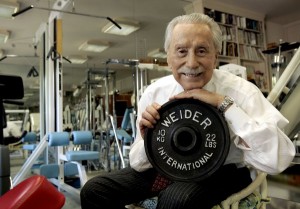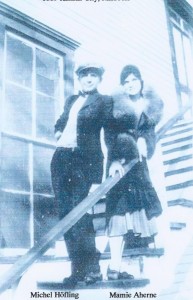Maybe you never heard of Joe Weider. It is pronounced like Joe WEE-der. To me, it seems like I’ve known him all my life.
Big Joe started out as Little Joe, one of those 98-pound weaklings – OH, wait a second… there is probably no one reading this that remembers those old comic book ads that promised a body-builder’s-body to anyone who sent in the money for the booklet.
Those ads showed a scrawny guy lounging on the beach with his beautiful girlfriend, perfectly happy until the big beach bully strolls up and kicks sand in the poor guy’s face. It was the basis for a series of ads that became a national joke, of sorts. The 98-pound weakling. It was like saying Loser! Or Whatever! Or LOL ROFL OMG! Everybody knew what it meant.
Little Joe became Bigger Joe. If he was scrawny to start with, he worked out to make up for it. Then, during the Great Depression, he started what became an empire of muscle magazines, equipment designed for bodybuilding and fitness, and diet supplements. He was one of the backers of bodybuilding contests that featured superstars like Arnold Schwarzenegger.
In truth, Weider discovered the bodybuilding formula in a magazine. An immediate devotee, he continued his fitness formula for life.
He died yesterday, at the age of 93. He wasn’t infirm or out of shape, but his heart gave out.
Even in his latter years, ages 70s and 80s, he was chiseled and fit. After all the years, he still had a following of readers, people who took up Muscles and Fitness, Flex, Fitness, and Shape, a magazine for women. All together, it amounted to some 25 million readers. In those pages were people like Schwarzenegger, Cher, and Sylvester Stallone.
For my part, I remember thinking about getting in shape. I laid down on the couch until that thought went away. Joe Wieder was a product in my mother’s health food stores and not so much a destination for my lifestyle intentions.
Here’s the weird part: I remember the canisters of the Joe Weider products more than the man himself. I guess that’s proof that his legacy will live on. RIP Mr. W. When I was stocking the shelves for one of the country’s health food pioneers, you were just a name on a product.
Age 93.
In anybody’s book, the man achieved a ripe old age. Probably moving around in his latter years faster than I am now, and I’m many, many years his junior.
For many pioneers of the heath food and body building industry, Joe Weider was the Jackie Robinson, the Charles Lindbergh, the Lewis and Clark, and the Edmund Hillary. (Google them, if you don’t know these pioneers in their own fields…)
RIP Mr Weider. You were ahead of your time, and lived long enough to see the results of your efforts.
I’m thinking about getting in shape and it is in no way an intention of disrespect, if I lay down for a minute or two to think about it first.


